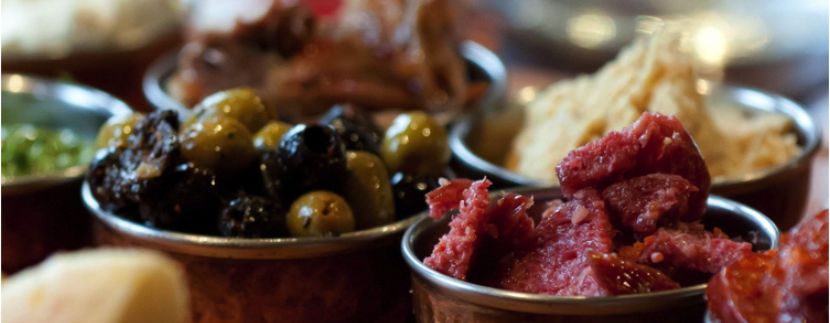Food & Drink - HIT THE TAPAS TRAIL

HIT THE TAPAS TRAIL
Overtime tapas have become an integral part of Spanish culture, and more of a social habit than a simple snack. And since the launch of the famous “Tapas Route”, they even carry a competitive element, which can not only bring increased clientele, but also honour and other exciting rewards to their Inventor!
The word tapa literally means “lid” or “cover” in Spanish, so you may wonder how it came to describe this national gastronomic tradition…
WHAT IS A “TAPA”?
For those who are not familiar with the term, or have yet to get to grips with the Spanish tradition, a “tapa” is a snack or appetizer for one person, which is generally inexpensive, easy-to-prepare and can be served hot or cold. Popular examples include olives, cheeses, hams, baby squid rings, pork in tomato sauce and potatoes in garlic mayonnaise; although a small portion of virtually anything can be offered as a tapa, with many establishments creating their own house specialties. As they are perceived as more of a quick nibble to be eaten between meals, people enjoy tapas whilst engaging in normal conversation and will not necessarily sit down to do so. They are often teamed with a swift glass of wine, beer or sherry, in a similar way to how the Brits might fill a hunger gap with a cup of tea and a biscuit or piece of cake!
WHERE DO TAPAS COME FROM?
The word tapa literally means “lid” or “cover” in Spanish, so you may wonder how it came to describe this national gastronomic tradition…
Well, it is widely accepted that the tapa originated in the sherry producing areas of Andalucia in Southern Spain, where it was eaten by land workers who endured long hours in the fields and needed to refuel at regular intervals between their main meals of the day. The workers would take a break in the local bars where they would sip sherry, and the proprietors would cover their glasses with a piece of bread to prevent the fruit flies from taking a dive. The custom then went a step further, when the bar owners began to balance a plate containing snacks of bread, cheese, olives, or anything salty on top of the glass to encourage them to stay for longer and take another drink. The food was given free of charge and meant as a token of thanks for their loyalty to the bar.
Although tapas are still widely available to order in bars and restaurants throughout the country, today most places will make a charge for them, limiting the complimentary snacks, if any, to nuts or crisps. However, Granada, in Andalucia, is still officially recognized as the Tapas Capital of Spain for its generous servings of tapas, which are always given free of charge to anyone who orders a drink. Here it is quite normal to meet friends for a “coffee and chat”, and indulge in a substantial, complimentary lunch at the same time!

 Spanish
Spanish German
German Dutch
Dutch